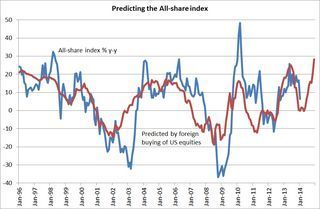How not to write about stock markets
Ha-Joon Chang's claim that stock markets are "heading for trouble" depresses me. I had hoped that stock market punditry had moved beyond some guy's opinion.
What I mean is that a sensible view on the prospects for markets can take one of two forms - and I confess to being ambivalent between them.
The first one is that markets are complex emergent processes which are inherently impossible to predict. On this view, we just can't say where they're heading. All we can do is have a vague idea of expected returns and the standard deviation around them.
In this context, Chang misses the point here:
No one is offering a new narrative justifying the new bubbles because, well, there isn't any plausible story.
Such narratives are not only impossible - we can't foresee the future - but pernicious, because they give a false sense of security. All you need to justify the current level of share prices is a basic bit of economic theory - that risky assets must offer higher expected returns than safe ones, so equities should be expected to rise. Granted, this theory is questionable. But Chang doesn't question it. 
The second line of attack is to look for evidence of predictability in returns. My favourite indicator here is foreign buying of US equities*. When this is high, it's a sign that global investors are irrationally exuberant and so shares are heading for a fall. Last year, though, foreigners were net sellers, which points to good returns this year.
Again, though, Chang presents no evidence here. In fact, he ducks a chance to present some. He says:
Share prices are high mainly because of the huge amount of money sloshing around thanks to quantitative easing.
However, the Fed is only likely to withdraw QE if the economic outlook improves, which poses the question: could it be that the stock market will gain more from better growth than it loses from less loose monetary policy? I've suggested that the answer is: yes. Please, show me evidence I might be wrong - because Chang doesn't.
Now, I don't say this to say stock markets will definitely rise - as if anyone gives a toss about my opinion. In fact, I guarantee that they'll fall some time.
Instead, my point is that discussions of the market should be scientific: is there evidence of predictability or not? What they should not be is just some guy's judgement. This is especially true because we know that such judgments are prone to countless cognitive biases. I fear that one here is wishful thinking. The left wants to believe that finance will get its comeuppance, and the wish generates the belief. But we can, and should, try to do better than this.
* The regression equation in my chart is: annual change in All-share index = 20.72 - 0.188 x foreign buying of US equities, $bn in the previous 12 months. R-squared = 45% since Jan 1996, standard error = 12pp. And no, this is not just in-sample fitting.
Chris Dillow's Blog
- Chris Dillow's profile
- 2 followers



